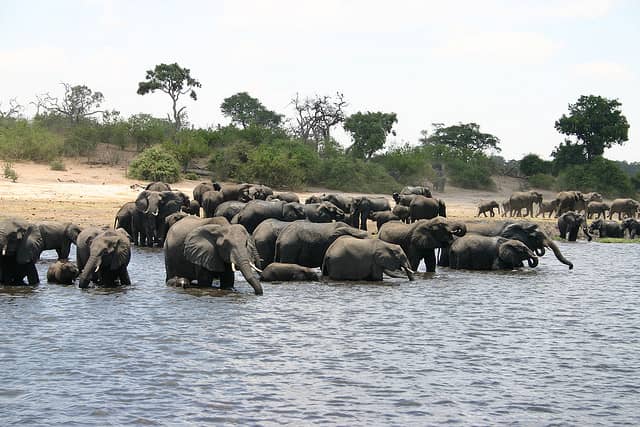African Nation of Botswana Declares Countrywide Ban on Hunting
OutdoorHub Reporters 11.30.12

The Ministry of Environment, Wildlife and Tourism in Botswana announced on Thursday it will enforce a ban on all hunting in the country effective January 1, 2014 saying that wildlife populations are declining.
Botswana, a land-locked country in southern Africa, boasts roughly one-third of the world’s elephant population, or about 130,000 of the large herbivores. Its large national parks and the Kalahari Desert are home to lions, giraffes, wild dogs, antelopes, buffalo, wildebeests and more. The country is a premier destination for safaris.
At 12 percent of the annual GDP, tourism is the country’s second biggest industry after diamond mining, but tourism doesn’t outweigh its interpretation of conservation, according to the ministry.
The ministry claimed that hunting had only contributed a minimal amount to the tourism sector, according to the BBC. The country is grappling with a sharp population drop of some of its wildlife species.
“If left unchecked this decline poses a genuine threat to both the conservation of our natural heritage and the long term health of the local tourist industry which currently ranks second to diamonds in terms of its revenue earnings,” the ministry said.
Pro-sportsmen groups like Safari Club International (SCI) dispute the ministry’s assertions.
“The notion that hunting has only contributed a ‘minimal amount to the tourism sector’ is categorically untrue,” says SCI’s Director of Hunter Advocacy and Science Based Conservation Melissa Simpson. “Sport hunting in Botswana generates $20 million annually, and creates approximately 1,000 local jobs. In 2005, $6.7 million was generated from sport-license fees alone in Botswana.”
Simpson drew a comparison between the actual money that stays in Botswana through tourism-related spending and that which stays via hunting.
“Sport hunting revenues are far more successful at directly helping the local rural economy,” she continued. “Where 27% of general tourism revenues remain within Botswana’s borders, over 75% of sport hunting revenues remain in the country to help the local economy. Almost 50% accrue directly to local rural economies. Safari Club International Foundation recently held our African Wildlife Consultative Forum in Kasane, Botswana. During the four-day meeting representatives of every southern and eastern African nation met to collaborate on sustainable use conservation practices to increase game populations, while simultaneously driving greatly needed financial resources to rural communities. Without the influx of international hunters, the stable, wildlife-driven economy of much of Botswana will be decimated.”
Botswana’s president Ian Khama had mentioned implementing such a bill in his state of the nation address last month, according to the AFP. The ministry said the ban will still allow for individual licenses for specific game to be hunting in specific circumstances, such as “for traditional hunting by some local communities within designated wildlife management areas.”

